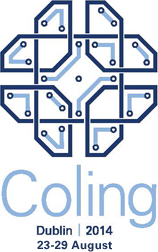Keynote Speaker
Roberto Navigli, Sapienza University of Rome [Home]
(Digital) goodies from the ERC Wishing Well:
BabelNet, Babelfy, video games with a purpose and the Wikipedia bitaxonomy
Multilinguality is a key feature of today’s Web, and it is this feature that we leverage and exploit in our research work at the Sapienza University of Rome’s Linguistic Computing Laboratory, which I am going to overview and showcase in this talk.
I will start by presenting BabelNet 2.5, a very large multilingual encyclopedic dictionary and semantic network, which covers 50 languages and provides both lexicographic and encyclopedic knowledge for all the open-class parts of speech, thanks to the seamless integration of WordNet, Wikipedia, Wiktionary, OmegaWiki, Wikidata and the Open Multilingual WordNet.
Next, I will present Babelfy, a unified approach that leverages BabelNet to perform word sense disambiguation and entity linking in arbitrary languages, with performance on both tasks on a par with, or surpassing, those of task-specific state-of-the-art supervised systems.
In the third part of the talk I will present two approaches to large-scale knowledge acquisition and validation: video games with a purpose, a novel, powerful paradigm for the large scale acquisition and validation of knowledge and data, and WiBi, our approach to the construction of a Wikipedia bitaxonomy, that is, the largest and most accurate currently available taxonomy of Wikipedia pages and a taxonomy of categories, aligned to each other.
Bio :
Roberto Navigli is an Associate Professor in the Department of Computer Science of the Sapienza University of Rome. He was awarded the Marco Cadoli 2007 AI*IA Prize for the best doctoral thesis in Artificial Intelligence and the Marco Somalvico 2013 AI*IA Prize for the best young researcher in AI. He is the recipient of an ERC Starting Grant in computer science and informatics on multilingual word sense disambiguation (2011-2016) and a co-PI of a Google Focused Research Award on Natural Language Understanding.
His research lies in the field of Natural Language Processing (including word sense disambiguation and induction, ontology learning from scratch, large-scale knowledge acquisition, open information extraction and relation extraction). He has served as an area chair of ACL, WWW, and *SEM, and a senior program committee member of IJCAI. Currently he is an Associate Editor of the Artificial Intelligence Journal, a member of the editorial board of the Journal of Natural Language Engineering, a guest editor of the Journal of Web Semantics, and a former editorial board member of Computational Linguistics.


